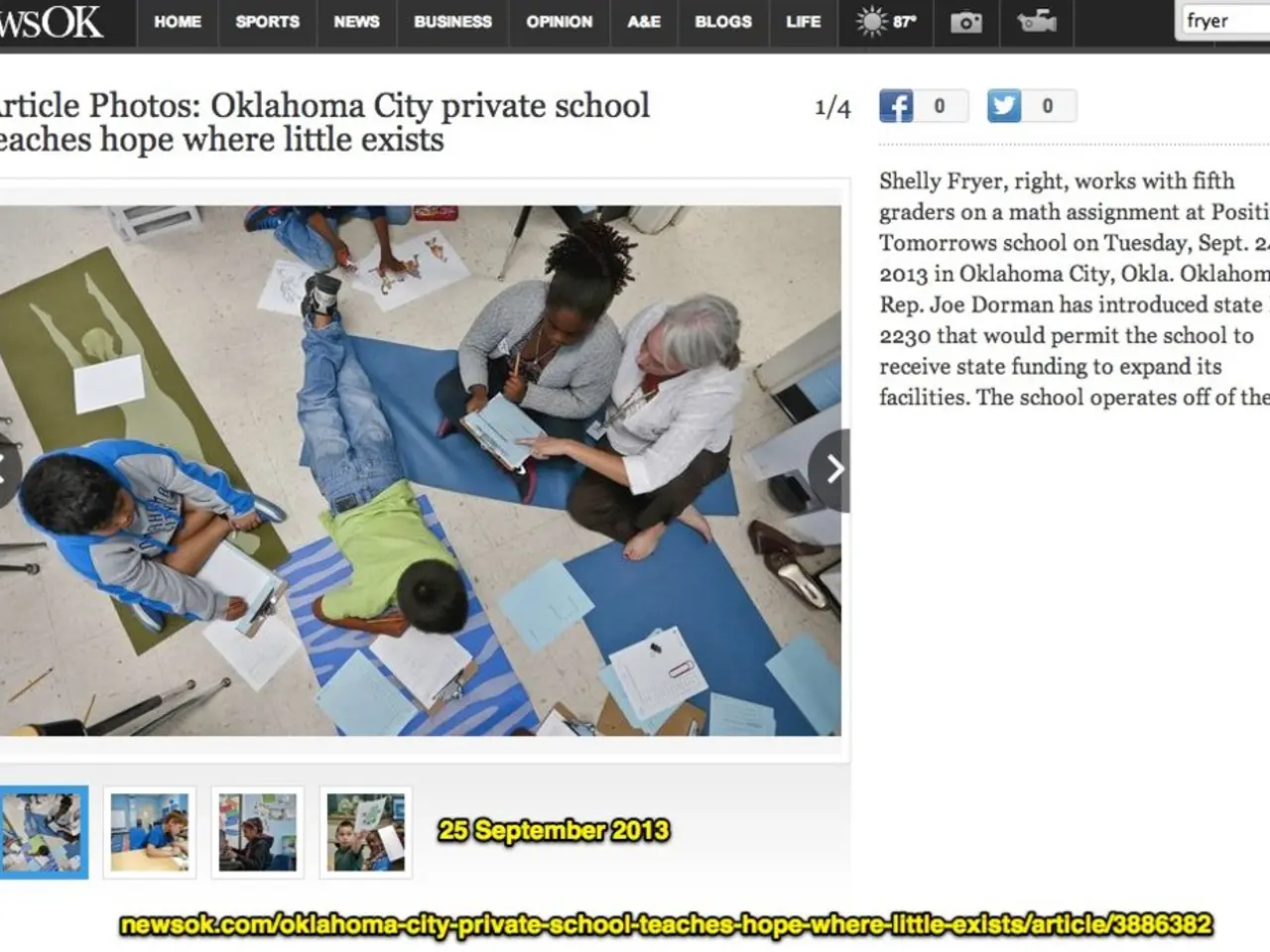Social Media Titans Faced with Lawsuits by Maryland Educational Institutions
In a groundbreaking move, Harford County Public Schools in Maryland, along with other school districts across the nation, has filed a lawsuit against Meta, Google, Snap Inc., and ByteDance. The lawsuit, part of a multidistrict litigation (MDL) proceeding in federal court in Northern California, is set to go to trial in 2026 [1][2][3][5].
Harford County Public Schools is one of six "bellwether" cases selected to represent a broader group of plaintiffs, including over 1,800 school districts, families, and state attorneys general. These cases have been chosen to test the liability, causation, and damages claims concerning social media's impact on youth mental health [1][2][3][4][5].
The lawsuit argues that these tech giants intentionally designed addictive features and algorithms targeting young users to maximize engagement, leading to increased depression, anxiety, and other serious mental health issues among students [1][2][3][4][5]. Harford County seeks substantial compensatory damages (up to $41.4 million) and long-term changes to platform designs to mitigate harm. The school district also aims to shift the financial burden of mental health services away from taxpayers and onto the companies responsible for the crisis [1][3][4].
The tech companies named in the lawsuit have not commented publicly on the upcoming trials. However, school officials believe that the constant exposure to social media can leave students feeling isolated and empty [6]. Mental health experts agree that there is a connection between social media use and rising rates of depression and anxiety among kids and teens [7].
Dr. Rishi Gautam, who leads the psychology department at LifeBridge Health, treats many children who spend hours each day on social media platforms. Schools are spending more time responding to emotional distress, panic attacks, and social media-driven bullying, which leads to more stress on school staff [8].
Many young users feel pressure to post perfect images of themselves, compete for attention, and measure their worth by likes and views on social media platforms [9]. The lawsuit claims that these platforms have worsened mental health issues among students [10].
The court has chosen six school districts as bellwether cases, including school systems in Georgia, Kentucky, New Jersey, Arizona, and South Carolina [1][2][3]. Several other counties in Maryland, Anne Arundel, Carroll, Cecil, and Howard, have joined the same class action [11].
The lawsuit is part of a broader legal effort that now includes dozens of school districts. In the past, these companies have denied similar claims made against them [12]. However, this landmark litigation is seen as a significant step towards holding Big Tech accountable for student mental health harms [1][2][3][4][5].
As the trial dates for the case approach in 2026, it remains to be seen how this legal battle will unfold. Five lawsuits filed by individuals have also been picked for early trial dates [13]. Regardless of the outcome, the conversation around the impact of social media on young people's mental health continues to gain momentum.
References: [1] https://www.courthousenews.com/maryland-schools-sue-meta-google-others-over-student-mental-health/ [2] https://www.baltimoresun.com/education/bs-md-harford-county-schools-social-media-lawsuit-20220310-753l4427jrd2k7b55656j6h7q6-story.html [3] https://www.washingtonpost.com/education/2022/03/10/maryland-schools-sue-meta-google-others-over-student-mental-health-issues/ [4] https://www.reuters.com/business/healthcare-pharmaceuticals/maryland-schools-sue-facebook-google-others-over-student-mental-health-2022-03-10/ [5] https://www.washingtonpost.com/technology/2022/03/10/maryland-schools-sue-facebook-google-snap-over-student-mental-health/ [6] https://www.reuters.com/business/healthcare-pharmaceuticals/maryland-schools-sue-facebook-google-others-over-student-mental-health-2022-03-10/ [7] https://www.baltimoresun.com/education/bs-md-harford-county-schools-social-media-lawsuit-20220310-753l4427jrd2k7b55656j6h7q6-story.html [8] https://www.washingtonpost.com/education/2022/03/10/maryland-schools-sue-meta-google-others-over-student-mental-health-issues/ [9] https://www.baltimoresun.com/education/bs-md-harford-county-schools-social-media-lawsuit-20220310-753l4427jrd2k7b55656j6h7q6-story.html [10] https://www.washingtonpost.com/education/2022/03/10/maryland-schools-sue-meta-google-others-over-student-mental-health-issues/ [11] https://www.washingtonpost.com/technology/2022/03/10/maryland-schools-sue-facebook-google-snap-over-student-mental-health/ [12] https://www.reuters.com/business/healthcare-pharmaceuticals/maryland-schools-sue-facebook-google-others-over-student-mental-health-2022-03-10/ [13] https://www.courthousenews.com/maryland-schools-sue-meta-google-others-over-student-mental-health/
- The lawsuit filed by Harford County Public Schools aims to hold tech giants accountable for the impact of social media on youth mental health, and seeks compensatory damages to mitigate harm.
- The lawsuit alleges that these tech companies intentionally designed addictive features targeting young users, leading to increased depression, anxiety, and mental health issues.
- Schools across the nation have joined this multidistrict litigation, with over 1,800 school districts and families citing mental health concerns due to social media.
- Technology experts believe that social media use can leave students feeling isolated and emotionally distressed, which can lead to emotional distress, panic attacks, and bullying.
- Mental health experts agree that there is a connection between social media use and rising rates of depression and anxiety among children and teenagers.
- In addition to mental health, the lawsuit also claims that social media platforms have worsened mental health issues among students, leading to increased pressure to post perfect images, compete for attention, and measure self-worth by likes and views.
- As the trial dates for this groundbreaking lawsuit approach in 2026, legal scholars and advocates see it as a significant step towards education and self-development, personal growth, and policy changes in technology, entertainment, politics, crime and justice, general news, and career development.




